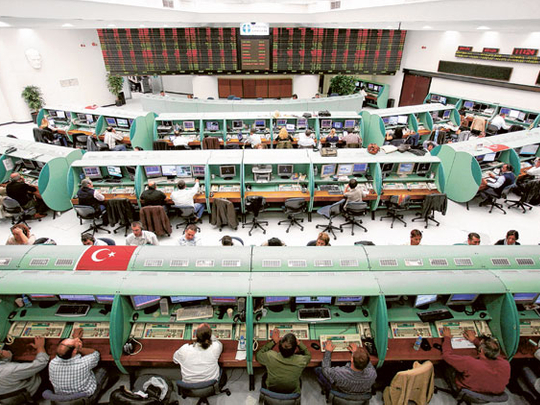
London/ Istanbul: Turkey's central bank triggered the biggest tumble in financial stocks since March 2009 with its plan to weaken the lira and narrow the trade gap by cutting interest rates.
The MSCI Turkey Financials Index has declined 21 per cent from its November 9 record, the first bear-market drop since the depths of the global financial crisis almost two years ago.
The gauge of lenders including Turkiye Garanti Bankasi AS and Akbank TAS has retreated three per cent since policy makers unexpectedly cut the benchmark interest rate for a second month yesterday.
Turkish banks' bond holdings are losing value as the lira's slide to the weakest level since June prompts foreign investors to sell the securities, said Plamen Monovski, chief investment officer at Renaissance Asset Managers.
Profits may get squeezed as the central bank raises reserve requirements to slow credit growth, according to Citigroup Inc. strategist Andrew Howell. Turkish bank earnings will stagnate in the next 12 months, compared with growth of 29 per cent for emerging market peers, more than 3,500 analyst estimates compiled by Bloomberg show.
"It's probably too early to call this a buying opportunity," Howell, the London-based emerging-market strategist at Citigroup who cut his rating on Turkish stocks to "neutral" in October, said in a phone interview.
"There are some investors who are stuck in a trade that's going against them, and the question is whether this news flow drives them to capitulate. The risk is the market could overshoot to the downside."
The MSCI Turkey financials index declined 0.3 per cent at 11:37am in Istanbul yesterday, heading for the lowest level on a closing basis since July 5. Yields on Turkey's two-year bonds rose 17 basis points to 7.67 per cent, the highest since December 8. The lira fluctuated, last trading 0.3 per cent stronger at 1.5799 per dollar.
"A spike in bond yields will have an immediate reflection on Turkish earnings," Monovski, whose Renaissance Emerging Europe Equity Fund has outperformed 95 per cent of peers this year, said in a phone interview. "That's not impossible to contemplate if the Turkish lira remains under considerable pressure. Bond investors will feel the heat."
The MSCI Turkey financial index surged 310 per cent from its 2008 low through its November peak as a lending boom helped Turkey's economy expand at a rate near 8 per cent last year, faster than any other European country, according to estimates from central bank Governor Durmus Yilmaz.
Now Yilmaz is trying to contain the expansion while cutting interest rates, a strategy designed to curb inflows of so-called hot money into the country, weaken the lira and narrow the current-account deficit from about 6 per cent of gross domestic product. The central bank raised the reserve ratio for deposit and savings accounts of up to one month to 8 per cent on December 17 from 6 per cent.
Turkey's benchmark interest rate was lowered by 0.25 percentage point to a record low of 6.25 per cent yesterday, according to a statement on the Ankara-based central bank's website.
Four of 11 economists surveyed by Bloomberg had forecast a cut, with the rest predicting no change. The lira weakened 2.2 per cent after the move and bond yields rose.










